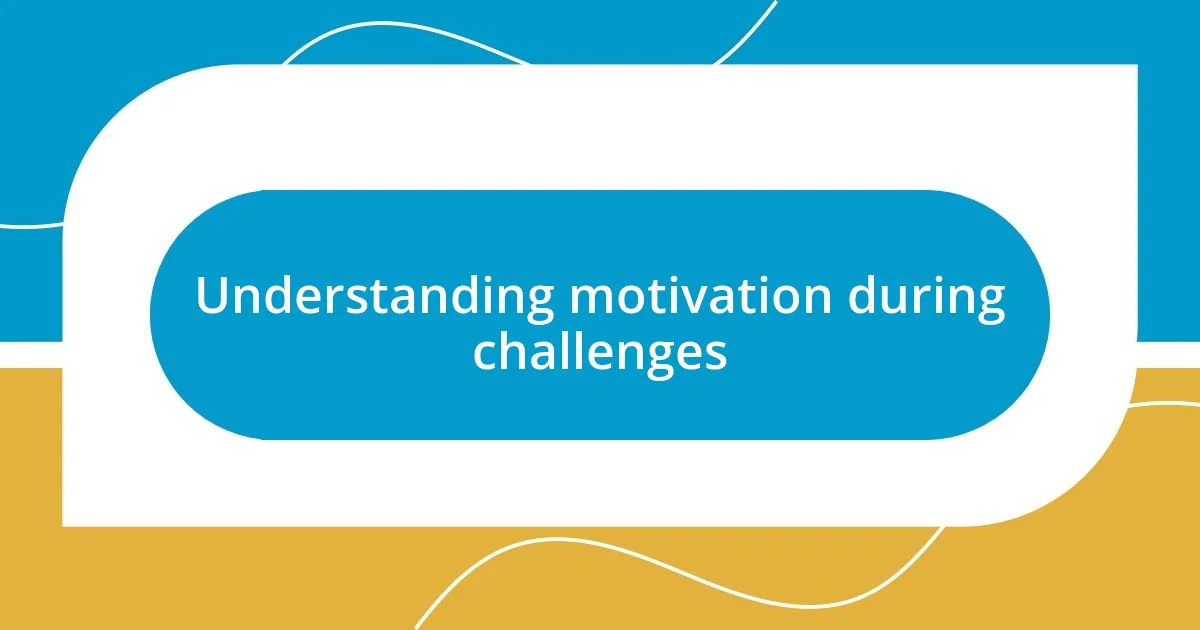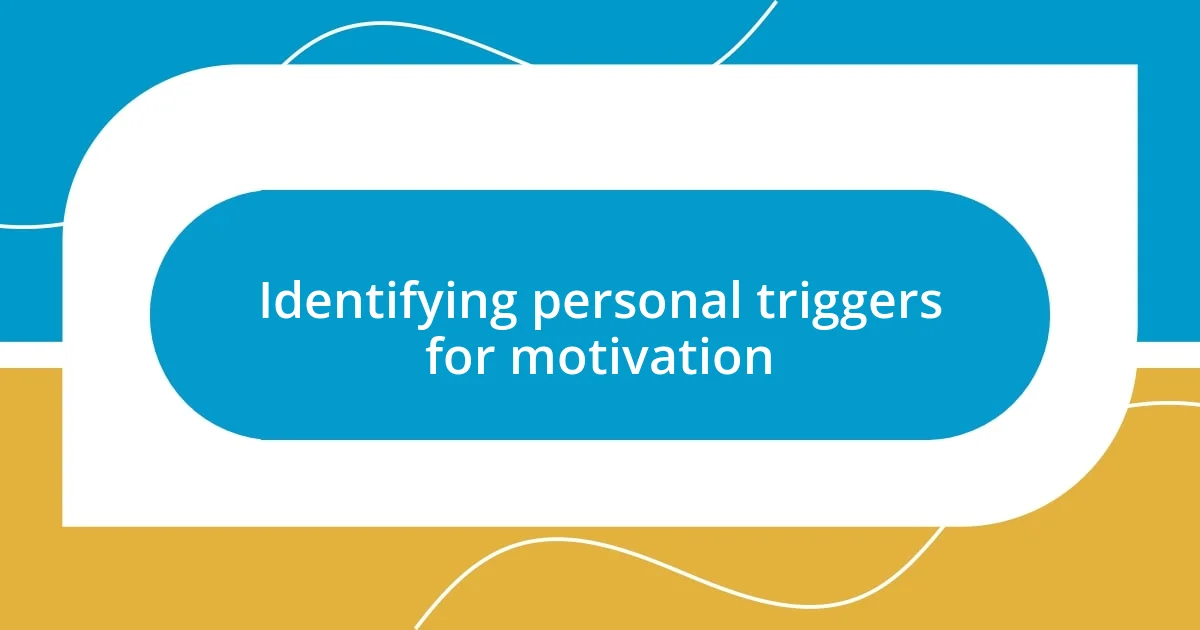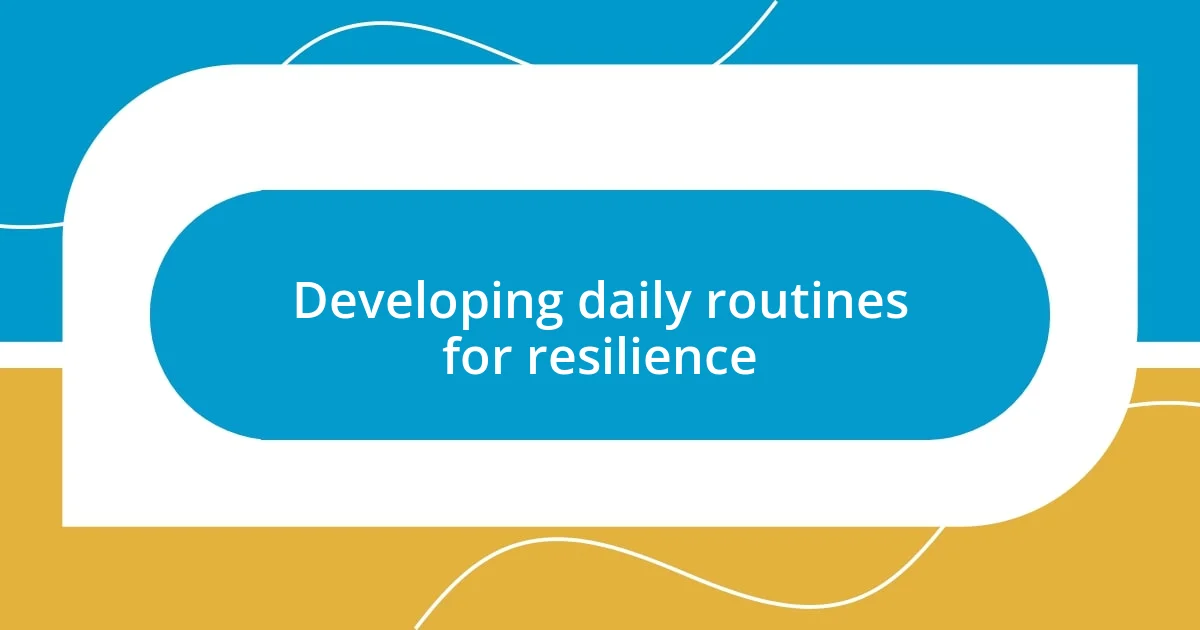Key takeaways:
- Understanding intrinsic motivations and reframing challenges as opportunities for growth can help rekindle motivation during tough times.
- Identifying personal triggers for motivation, such as music and a supportive environment, plays a crucial role in overcoming adversity.
- Developing daily routines, setting achievable goals, and connecting with supportive communities provide essential strategies for resilience and motivation.

Understanding motivation during challenges
Motivation can often feel elusive during tough times, can’t it? I recall a period when I faced a significant setback in my career. It was a struggle to find the drive to get out of bed, yet I discovered that digging deep into my intrinsic motivations—like my passion for learning—helped me rekindle that spark.
When challenges arise, understanding what truly motivates us becomes crucial. I remember a particularly chaotic season in my life when routine felt like an uphill battle. I started reflecting on my core values, like resilience and growth, which reminded me that tough times could be opportunities for personal evolution rather than merely obstacles.
It’s fascinating how our minds work during adversity. I often find that framing my struggles as temporary setbacks rather than permanent failures shifts my perspective. By asking myself how each challenge shapes my future, I cultivate a sense of purpose that not only drives my actions but also fills me with hope amidst the chaos.

Identifying personal triggers for motivation
Identifying what personally triggers your motivation is often the first step in overcoming tough times. For me, I realized that music acts as a significant catalyst. There were days when I could barely muster the energy to move, but playing my favorite upbeat songs transformed my mood in an instant. I’ve learned to curate playlists that ignite my enthusiasm, and they become my companion, reminding me of brighter days.
It’s also interesting to note how our environment influences motivation. I vividly remember a time when I felt stuck in my workspace. I decided to rearrange my desk, adding plants and personal photographs that inspired me. This seemingly small change created a visually stimulating environment that constantly reminded me of my aspirations and dreams, fueling my determination to push through the hard moments.
Lastly, tapping into my support system serves as a powerful motivator. During a challenging period, I reached out to friends who had overcame similar difficulties. Their stories of perseverance reignited my resolve. Hearing firsthand accounts and advice from them not only provided reassurance but also equipped me with the motivation I needed to navigate my own challenges.
| Personal Trigger | Impact on Motivation |
|---|---|
| Music | Transforms mood and energy levels |
| Environment | Creates visual inspiration and reminders |
| Support System | Offers encouragement and shared experiences |

Developing daily routines for resilience
Developing daily routines has been a game changer for my resilience during tough times. I’ve found that consistency in my schedule offers a comforting sense of control when everything else feels chaotic. For instance, I started setting a morning ritual that includes a few minutes of meditation, followed by a short workout. This tiny investment of time in the morning empowers me, creating a mental space where I can confront daily challenges with a clear head and a determined spirit.
Here are some strategies that have helped me develop effective daily routines:
- Set a Morning Intention: I write down a positive affirmation or goal that grounds me for the day ahead.
- Incorporate Movement: Whether it’s yoga or a brisk walk, I’ve discovered that physical activity is essential for mental resilience.
- Schedule Breaks: Allowing myself to step away from tasks has proven crucial. I use a timer to ensure I take short breaks to recharge.
- Reflect Evening Journals: Each evening, I jot down three things I’m grateful for. This practice helps me focus on the positive, no matter how my day unfolded.
- Stay Flexible: Life can be unpredictable, and I remind myself that adjusting my routine when needed is completely okay.
Navigating through life’s storms can be daunting, but creating these routines provides a sturdy anchor. It’s heartening to realize that even on the bleakest days, I can find resilience through the rhythms I build.

Practicing positive self-talk techniques
Practicing positive self-talk has been essential for me in maintaining motivation during tough times. There were moments when I felt overwhelmed, and negative thoughts crept in, threatening to derail my progress. I began countering these thoughts by consciously asking myself, “What’s the best I can believe about this situation?” This simple shift opens up a pathway to optimism, allowing me to reframe difficulties as opportunities for growth.
One technique that I find particularly valuable is creating affirmations tailored to my personal challenges. For example, during a particularly stressful project, I recited, “I am capable, and I thrive under pressure,” each morning. This repetitive reinforcement somehow made the weight of those deadlines feel lighter, almost like I was donning a protective armor of positivity. It turned out that believing in myself was the first step towards achieving what I initially thought was impossible.
Additionally, I’ve discovered that writing down my thoughts adds clarity and purpose to my self-talk. One day, feeling particularly defeated, I decided to journal about my struggles. As I wrote, I found myself transforming the negatives into positives, turning “I can’t handle this” into “I am learning to handle challenges one step at a time.” This practice not only uplifts me but also acts as a motivational reminder of how resilient I can be when faced with adversity. Have you ever tried putting your thoughts on paper? You might just surprise yourself with how powerful your own words can be.

Setting achievable goals in adversity
Setting achievable goals during adverse times is crucial for maintaining focus and motivation. I remember a particularly challenging period when everything felt overwhelming, and I was tempted to abandon my ambitions. Instead of setting lofty targets, I broke my goals down into smaller, more manageable tasks. This approach not only made my objectives less daunting but also provided me with a string of small victories that bolstered my confidence. Have you ever noticed how accomplishing even a tiny task can lift your spirits?
In this moment, I learned the power of prioritization. I often made a simple list at the beginning of each week, identifying the top three goals I wanted to accomplish, each grounded in reality. For instance, instead of saying “I will finish my book this month,” I set a goal to write just 300 words a day. This commitment, although modest, made the task feel attainable, and I found that those small bits of progress added up quickly. It was reassuring to see how such minor steps could lead to significant achievements, helping me feel in control even when life was throwing curveballs.
I also embraced flexibility within my goals, understanding that life can sometimes lead us in unexpected directions. One week, I planned to start a new exercise routine, but an unanticipated family issue arose. Instead of beating myself up about not sticking to my original plan, I shifted my goal for the week to include simple at-home workouts that fit my schedule. How often do we forget that adapting our expectations can be just as powerful as achieving them? This perspective not only reduced my stress but also kept me moving forward in ways that felt right for the moment. Remember, it’s about progress, not perfection.

Connecting with supportive communities
Connecting with supportive communities has been a game changer for me during tough times. I remember the days when I felt isolated in my struggles, thinking I was alone in this journey. Reaching out and engaging with people who understood my challenges created an incredible sense of belonging. Have you ever felt like your worries were too heavy to carry alone? The moment I started sharing my experiences with others, I found comfort in knowing that we could lift each other up.
Joining a local support group transformed my outlook on adversity. As I listened to others share their stories, I recognized common threads in our experiences. It was reassuring to hear that someone else had faced similar obstacles and emerged stronger on the other side. I got to connect with amazing individuals who became my sounding board during rough patches, where we shared not just struggles but also victories. The simple act of saying, “I understand what you’re going through,” was often more powerful than I realized, allowing genuine connections that motivated me to persevere.
Online communities have also played a significant role in my motivation. When I faced a particularly tough personal challenge, I turned to social media groups dedicated to resilience and mental wellness. Engaging in vibrant discussions and sharing resources helped me feel less alone. I remember one post that resonated deeply: someone shared their mantra, “This too shall pass,” which reminded me that tough times don’t last forever. Seeing others’ strength bolstered my own and provided a sense of community that was both uplifting and essential during my struggles. Have you ever found support in unexpected places?














